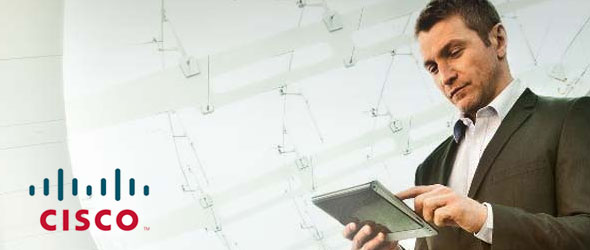Cisco Systems, Inc. is an American multinational corporation headquartered in San Jose, California, that designs, manufactures, and sells networking equipment. The stock was added to the Dow Jones Industrial Average on June 8, 2009, and is also included in the S&P 500 Index, the Russell 1000 Index, NASDAQ-100 Index and the Russell 1000 Growth Stock Index.
Cisco acquired a variety of companies to spin products and talent into the company. In 1995–1996 the company completed 11 acquisitions. Several acquisitions, such as Stratacom, were the biggest deals in the industry when they occurred. During the Internet boom in 1999, the company acquired Cerent Corporation, a start-up company located in Petaluma, California, for about US$7 billion. It was the most expensive acquisition made by Cisco to that date, and only the acquisition of Scientific Atlanta has been larger. In 1999 Cisco also acquired stake for $1 Billion in KPMG Consulting to enable establishing Internet firm Metrius founded by Keyur Patel of Fuse. Several acquired companies have grown into $1Bn+ business units for Cisco, including LAN switching, Enterprise Voice over Internet Protocol (VOIP) platform Webex, and home networking. The latter came as result of Cisco acquiring Linksys in 2003 and in 2010 was supplemented with new product line dubbed Cisco Valet.
Cisco announced on January 4, 2007 that it would buy IronPort in a deal valued at US$830 million and completed the acquisition on June 25, 2007. IronPort was best known for its IronPort AntiSpam, its SenderBase email reputation service, and its email security appliances. Accordingly, IronPort was integrated into the Cisco Security business unit. Ironport’s Senderbase was renamed as Sensorbase to take account of the input into this database that other Cisco devices provide. SensorBase allows these devices to build a risk profile on IP addresses, therefore allowing risk profiles to be dynamically created on http sites and SMTP email sources.
In more recent merger deals, Cisco bought Starent Networks (a mobile packet core company) and Moto Development Group, a product design consulting firm that helped develop Cisco’s Flip video camera. Also in 2010, Cisco became a key stakeholder in e-Skills Week. In March 2011, Cisco completed the acquisition of privately held network configuration and change management software company Pari Networks.
Although many buy-ins (such as Crescendo Networks in 1993, Tandberg in 2010) resulted in acquisition of flagship technology to Cisco, many others have failed—partially or completely. For instance, in 2010 Cisco occupied a meaningful share of the packet-optical market, revenues were still not on par with US$7 billion price tag paid in 1999 for Cerent. Some of acquired technologies (such as Flip from Pure Digital) saw their product lines terminated.
In January 2013, Cisco Systems acquired Israeli software maker Intucell for around $475 million in cash, a move to expand its mobile network management offerings. In the same month, Cisco Systems acquired Cognitive Security, a company focused on Cyber Threat Protection. Cisco also acquired SolveDirect (cloud services) in March 2013 and Ubiquisys (mobile software) in April 2013.
On June 17, 2014, Cisco announced its intent to acquire privately held Tail-f Systems, a leader in multi-vendor network service orchestration solutions for traditional and virtualized networks.
Since 9/11, the U.S. government’s crackdown on and investigations of funding, intentional or inadvertent, of terrorist groups have caused some trepidation in the philanthropic world. Suspicions that the efforts might put a chill on international giving seemed justified when Cisco Systems Inc. last May suspended its employee matching gifts program.
Cisco Donates to Nonprofit Organizations. In the months prior, Cisco’s program and others at some big U.S. multinationals had been accused by some Indian groups of contributing, unwittingly, to sectarian violence in their country. An d in halting its program, Cisco, the San Jose, Calif.-based networking products giant, cited as one reason uncertainty over interpreting U.S. Treasury voluntary guidelines, issued in November 2002, on preventing diversion of charitable dollars to terrorism.
Now, Cisco’s program is back on line– though its return has been little noticed outside the company. Cisco said it is still awaiting more clarity on the Treasury guidelines, but the downtime allowed it to retool a program that had become burdensome to manage as employee rolls around the world increased.
Rita Kusler, chief financial and operating officer of Princeton, N.J.-based JK Group Inc., which handles matching gift programs for 160 clients (not including Cisco), said there has been concern in her field about Cisco program’s suspension and the Treasury guidelines. But she knew of no other firm that had followed Cisco’s lead, except on cost-cutting grounds.
Under such programs, employees contribute to a charity of their choice and ask their bosses to match the gift by at least a factor of one. Kusler said uncertainty persists over whether the government will impose onerous investigative requirements on giving abroad.
Responding to a government call last year for comment on the guidelines, some philanthropies contended they were being enlisted to do things outside their capabilities, such as ferreting out money-laundering schemes in countries with civil unrest and weak banking systems.
“How much due diligence do you do when the average gift is $250?” Kusler said.
Cisco said it began informing employees last October that its program was being resumed, although with some modification. But its Web site didn’t post the change until late January.
Cisco said the program, which gave away $2.9 million in the fiscal year that ended last July, has been more aligned with its corporate goal of building teamwork.
“At least 10 employees need to come together to bring a new entrant [matching gift recipient] into the program, except for schools,” said Michael Yutrzenka, Cisco Foundation executive director.
The change could have another effect — limiting the number of unfamiliar foreign charities that require Cisco’s scrutiny.
Cisco matches employee and retiree donations up to $1,000 to most nonprofit organizations including: Educational institutions (K-12 included), Health and human services, Arts and cultural organizations, Civic and community organizations, Environmental organizations, And nearly all other 501(c)(3) organizations.
Additional details on Cisco’s match program can be found at http://iwe.cisco.com/ws#web/ciscocitizen/giving-and-gift-matching-faqs (note, employees must be connected to the intranet to view this page.)
Through the company’s matching gift program, Cisco matches charitable donations to nearly all 501(c)(3) organizations and schools. The company also provides a volunteer grant program where Cisco provides grants of $10 per hour to organizations where employees volunteer.


